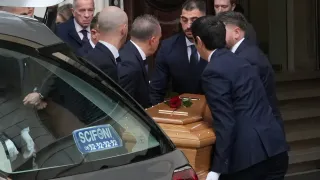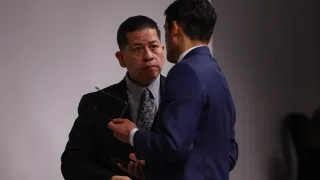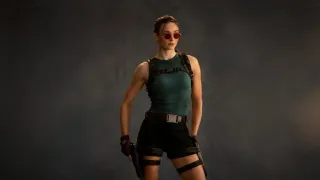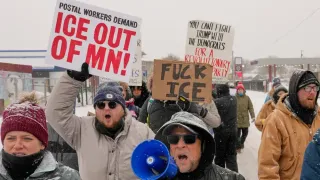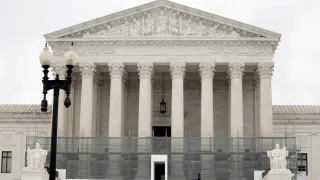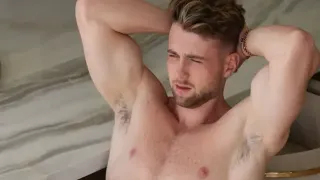January 7, 2024
EDGE Interview: Andrew Haigh Looks at the Past Through a Queer Lens in 'All of Us Strangers'
Frank J. Avella READ TIME: 14 MIN.
EDGE: I've never heard another director say that he's watched interviews (as part of the casting process). You can get so much from somebody from that.
Andrew Haigh: So much. And, also, you can see what they're showing and what they're hiding. I think I'm relatively perceptive about people and it's what they're not showing that is the most interesting thing to me. You can see a certain vulnerability in people when they're doing interviews... I also think that what an actor chooses to do with their career says so much about the person they are. Like Charlotte in "45 Years" Her choices have been so fascinating in her career that I'm like, well, you're an interesting person. There were choices that you (made). It's so important. The work that someone does defines them in so many ways. So, you have to take that on board when you're trying to make a casting choice.
EDGE: And the chemistry between Andrew and Paul were off the charts, but Claire and Jamie, too. Did you make them all shag before? I'm joking.
Andrew Haigh: (laughs) Yes, it was a really awkward session. We were in a bad hotel, and we were like, come on, this is what we got to do. We've got to really force ourselves through this. (laughs)
EDGE: Have you ever been in a situation where the chemistry wasn't working? Not necessarily on this film? And what did you do?
Andrew Haigh: ...I've been really lucky. I do think the reason that chemistry sometimes doesn't work is that you just set it up wrong. And you don't nurture the right environment on set. That is so important. If you can nurture that environment so they don't spend time locked away in their own trailers not talking to each other, that you create an environment where people are getting to know each other. I think so much of my job on set is to understand what people need.... it can be quite exhausting. You're like a therapist, basically, for the whole of the shoot...But I think that's what you need to do as a director to make sure that everybody is comfortable enough to give the best performances.
EDGE: There's so much conversation about actors playing queer roles versus the best actor for the job. I'm curious where you land. And how did it relate to the casting of Andrew Scott?
Andrew Haigh: I did want someone that was that was queer to play Andrew's character, because there's so much nuance I'm trying to pick out genuine feeling that I needed that character to have. And I think any of us who are a certain age who grew up at a certain time, it's in our body. It's baked into our DNA. How we felt the fear, the terror, the worry--all that stuff. And I didn't want to have a straight actor playing that role. Because I'd have to then try to explain all that. You know what it's like, you sit down with a gay person, there's so much shared experience you don't even need to talk about...you go into a room full of queer people you're like, I can breathe a little bit easier. Most of the time, it depends if who you're in a room with, but most of the time...
But then outside of that, there's lots of choices that go into who you cast for the role. I understand the arguments about why it can only be a queer person playing a queer role, but I really do think it depends on the role. Look, I'm gay, I wrote it. The producer Graham was gay. You don't need everybody to be gay. You just need enough people who know what they're talking about to be part of that project.
EDGE: I wanted to talk about internalized homophobia because it's there in the film. It comes from the people who shape us, doesn't it? Parents, relatives, friends...
Andrew Haigh: ...So many of us have dealt with internalized homophobia for so long in our lives. We've grown up with it. Every day you were going to school and having to deal with it, having so much shame. Sometimes you can hear a younger generation sort of think, 'Oh, you guys are just full of self-loathing, you're fully shame, get over it! And you're like, hold on, we weren't born with self-loathing or shame, it was put upon us by the world we lived in. So, you can't condemn us for having those issues that were put upon us... It doesn't just go away when it's embedded in you growing up. And it is from our family. It's from everybody, the TV, the news... I think it's a life journey for a lot of queer people to shed that internalized homophobia. And for me, personally, it's been a journey. And the film is another step in that journey to shed that. It's a very complicated thing.
There's a line in the film when (Claire Foy) asks if Adam's lonely, and that it's a very lonely life. And he's like, If I am lonely, it's not because I'm gay. And he's right. But also, being gay in the world has made him lonely. So, it's not being gay that makes you lonely, it's being gay within the world that can make you lonely.
EDGE: "Lean on Pete." I adore that film. I really appreciated that you never felt the necessity to force a sexual orientation on Charlie. There was no obligatory girlfriend or hookup scene, I'm assuming that was deliberate.
Andrew Haigh: Absolutely. And it's so weird to me--in the original novel, there's no sense that that kid is queer--but there's something to me when I thought about Charlie that he felt like a queer kid. So, in some strange way, it felt like it was a story, as well, about a kid trying to find his way in the world and being torn between this freedom--this desire for freedom--but also a craving for stability. I feel like sometimes as queer people we're told we've got to just go and find our new family... well, no, sometimes we want the stability of our actual family. I felt like that spoke to America, as I see it, and even in a bigger way about this conflict between stability and freedom. America was born on this search for freedom, the individual, but that cannot be great for everybody... We don't all need to be let free in the world to fend for ourselves.
EDGE: There's a lot of anxiety and stress involved in filmmaking. You seem like a really well put together person, how do you deal with it and not go insane?
Andrew Haigh: It's a funny thing because I feel like I'm actually quite an anxious person. And I feel like during the process, there were so many times when the anxiety of making it is almost overwhelming. Why am I doing this? Why am I putting myself through this? And that's writing, shooting, is all different anxieties, editing, the fear that that project is now going to be in the world, and how is it going to be taken? Filmmakers. It's an exposing art form. Even if it's nothing to do with you, you're exposing something about yourself. I don't care what anyone says, you care about the reaction, you care how people take it. So, it can be a stressful thing. I mean, you can just ask my poor partner who has to deal with my stress and anxiety constantly at the end of each day. But there was something that still makes me want to do it. I can't imagine I would want to do it forever... I know some filmmakers keep working into their 70s and 80s. I can't imagine that will be me. I feel like there will be a time when it's like, you know what, that's enough now, I've done what I can do, and I need to have a quieter existence.
"All of Us Strangers" is in limited release at theaters. For more on the film,visit the film's website.
Watch the film's trailer:
